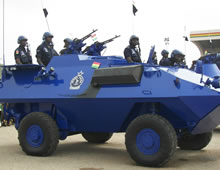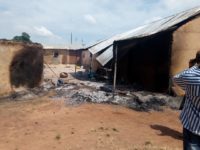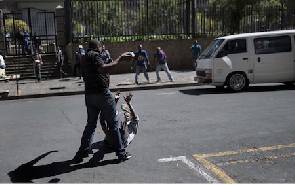 A 68-year-old woman has been shot dead in her home at Alavanyo-Kpeme in the Volta region.
A 68-year-old woman has been shot dead in her home at Alavanyo-Kpeme in the Volta region.
Francisca Agbodogli, according to Starr News’ Volta Regional correspondent Lambert Atsivor was fetching water from a barrel when she got shot in the head by an unknown assailant Saturday evening.
Police in the area have since deposited the body in a morgue at Kpando as they commence investigations into the incident.
Alavanyo and Nkonya have been under a dusk-to-dawn curfew over a protracted land dispute spanning almost a century.
Though the Police have treated such killings in the two areas as isolated criminal incidents, no culprits, according to Lambert Atsivor have been arrested in connection with past killings.
Criminals taking advantage of the conflict:
In January this year, the Ankobeahene of Nkonya Ahenkro Traditional Area, Nana Ampem Darko III asked the Government, police and security authorities to separate the undying age-old land dispute between the two communities from violent activities perpetrated by residents in the area using the land conflict as a disguise.
People from both sides have been killed in recurrent skirmishes, which were allegedly linked to the land dispute.
However, Nana Ampem Darko said at a forum in the Volta region between the traditional leaders and Vice President Kwesi Amissah-Arthur that: “All this atrocities that are happening is nowhere near the disputed land…”
“If we say we are fighting, the land is there and nobody is fighting on it… So I’ll plead with the powers-that-be, put the land problem as one chapter and look at the criminality and the atrocities that is happening on the other side,” Nana Ampem Darko urged.
“My farm was destroyed, my animals taken…it’s about five kilometres away from the disputed land…so inasmuch as there is land problem, I want to draw the attention of the authorities-that-be that look into the various attacks…and ask what is the problem?”
The Regional Security Council has placed a 14-hour curfew on the two communities and their surrounding areas as part of measures toward containing the intermittent fighting.
Meanwhile Security Analyst Emmanuel Bombande, who is the Executive Director of the West Africa Network for Peace Building (WANEP) a few months ago told Starr News that the curfew could be counterproductive.
“…It’s important that we do not see [the] curfew as a mechanism in itself that deals with a protracted conflicted that has a duration of more than nine decades.”
“…The curfew should be understood only in its temporary capacity to manage the escalation in the surge of violence,” he said.
He advised that the Government, which has the responsibility to protect people should “use curfews as a measure to control and coordinate security in order that people can be protected, lives protected and properties protected,” but not to see curfews as the panacea to the age-old conflict.
“To use that as if that in itself is dealing with the problem could be misleading and could be postponing and reinforcing a protracted conflict that reinforces itself and continues to make young people to become radicalised,” Bombande warned.
Outsiders exploiting the conflict:
Also the paramount Chief of Kpando Togbe Dagadu VIII in January said some people were exploiting the Nkonya-Alavanyo conflict for money, “…It is also a fact that there are some people outside who are fanning this conflict because they want to survive.” “They want to make money out of the situation. Let us not give those people a chance to make money at our expense and to kill our brothers, our fathers, our cousins and our sons. Let us together sit and resolve this conflict,” Togbe Dagadu VIII said at a meeting between Chiefs and traditional leaders of the two feuding sides at Kpando in the Volta region.
The Kpando chief also said though the 90-year-old conflict started with a land dispute, it is no more the case.
“This conflict started with land, but nobody is fighting now on that piece of land. The fighting is far away from the land…” he said, adding that the retaliation and recriminations must stop.
Historical account of Nkonya-Alavanyo conflict wrong:
The Paramount chief of Alavanyo traditional area, Togbe Tsedze Atakora VII also in January refuted claims that there was ever a land litigation between the Alavanyo and Nkonya traditional areas in the Volta region.
According to him, the land litigation was rather between some individuals from Nkonya-Tayi and Alavanyo-Kpeme.
“It might surprise everybody here that Alavanyo and Nkonya have never gone to court over land. If anybody has that record, let him show it… Alavanyo led by an Atakora and Nkonya led by Nana Okortor going to court? If you have that record just show it,” Togbe Atakora stated when Vice President Kwesi Amissah-Arthur met leaders of both traditional areas at Kpando. He emphasised that: “Some people from Nkonya-Tayi and six individuals from Alavanyo-[Kpeme] went to court over land.”
“So we should have limited this problem to those individuals from Nkonya and those individuals from Alavanyo who went to court over land, then we would have made the problem very small.”
“…I am saying that Alavanyo paramount chief has never led the people of Alavanyo to litigate over land with the paramount chief of Nkonya and I’m saying that if anyone has the record, let the person prove it. It has never happened,” Togbe Atakora VII insisted.





